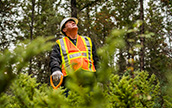Neighbouring communities
Engaging with communities is part of our approach to managing human rights and providing access to remedy. Shell’s HSSE & SP Control Framework helps to ensure that we operate responsibly and avoid or minimise the negative social impacts of our operations. The requirements set out in the framework also help us to maximise benefits arising from our presence, such as local employment and contractual opportunities. When we divest assets or exit areas, we use well-established processes, applied in a systematic way, to guide our assessment of risks in divestments.
Our requirements set rules, supplemented by guidance, for how we engage with communities that may be affected by our operations. Major projects and facilities that Shell operates have a social performance plan setting out how to manage potential negative impacts and maximise benefits. These plans typically begin with defining the social environment, with a particular focus on people who may be especially vulnerable to the potential impacts of our operations. Another important component is an effective community feedback mechanism for listening and responding to questions and resolving complaints in a timely manner. We have specific requirements to avoid, minimise or mitigate potential impacts on the traditional lifestyles and cultural heritage of indigenous peoples. We also have specific requirements to avoid, minimise or mitigate their involuntary resettlement.
We use our online community feedback tool, launched in 2020, to track and respond to all questions, complaints and feedback that we receive. It allows our network of about 100 community liaison officers (CLOs) to document feedback and outcomes.
The CLOs act as a bridge between local communities and our businesses. In 2021, travel restrictions and lockdowns due to the COVID-19 pandemic continued to limit our face-to-face engagement with members of communities. In response, our CLOs moved engagements online to maintain relationships virtually.
As part of our ongoing effort to improve community engagement, we developed an assessment tool in 2019, to measure the effectiveness of our community feedback mechanisms at 32 priority sites. The assessment is based on criteria set out in the UN Guiding Principles on Business and Human Rights. It has helped 18 priority sites to improve their community feedback mechanisms in the following areas:
- promoting public access to and transparency of the sites’ community feedback mechanisms;
- improving written procedures so they are better aligned with global good practice and more reflective of local circumstances;
- providing clear steps for recognising alternative options for communities to seek remedy; and
- respecting people’s anonymity and data privacy.
By the end of 2021, 10 sites updated their community feedback mechanisms so procedures are better aligned with the UN Guiding Principles on Business and Human Rights. Five sites have improved access and transparency by publishing the procedures for their community feedback mechanisms. We are working to improve community feedback mechanisms at 20 sites.
In 2020, we developed a guide to help sites improve the effectiveness of their community feedback mechanisms. In 2021, we simplified this guide so it could be applied to a wider range of operations. In 2022, we plan to improve the methods for tracking how feedback is resolved.
See our website shell.com for more information about our work with communities.









